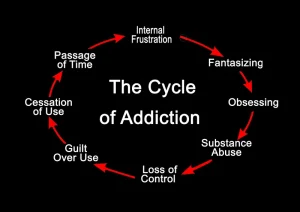
Smith is also concerned marijuana could become commercialized like tobacco. He worries large corporations may similarly misuse psychedelics if researchers discover psychedelics are effective treatments for depression, anxiety, and other psychiatric disorders. At least half of a person’s susceptibility to addiction can be linked https://ecosoberhouse.com/ to genetic factors. This means that addictive behavior is genetic, but there’s more at play than genetics (nature) alone. Always consult your healthcare provider before beginning a new treatment method. Most drugs affect the brain’s “reward circuit,” causing euphoria as well as flooding it with the chemical messenger dopamine.
Understanding Drug Use and Addiction DrugFacts
The terms “addiction” and “dependence” can seem similar, but they are different. Providing no-cost health care in a “Health Care Is a Right” setting was not the clinic’s only key underlying principle in 1967—or now. According to Smith, “The initial approach to addiction at the HAFC drug detoxification program revolved around therapeutic engagement, addiction vs dependence dealing with patients’ medical and psychiatric issues. The approach emphasized management of the problems that brought them into medical care.” If patients had underlying issues of depression or anxiety, those were dealt with to help them break away from drug use. He still remembers when doctors were punished for treating people dependent on drugs.
Data availability statement
Unlike tolerance, which focuses on how much of the substance you need to feel its effect, physical dependence happens when your body starts to rely on the drug. If you were to suddenly stop using it, you would likely experience some harsh symptoms. Dependence typically refers to the psychological and/or physiological adaptations that occur when the body is exposed to a stimulus over time. Addiction or substance use disorder occurs when individuals are largely unable to function without the drug. People who are addicted develop a physical and psychological reliance on a substance that leads them to go to extreme lengths to continue taking it.

Dependence vs. Addiction: How to Tell the Difference

For example, a person may drink alcohol when they feel stressed but otherwise feel no compulsion to drink. When addiction to a substance develops, it is called substance use disorder. But because the body has adapted to its presence, a person may experience negative effects if they lower the dosage or stop taking it altogether. Physical dependence is when the body adapts to a substance’s presence.
- In these cases, treatment involves gradually tapering off the drug over a set period to reduce withdrawal effects.
- Addictive disorders are highly treatable, and treatment at an inpatient or outpatient rehab can greatly increase the likelihood of long-term sobriety.
- When David E. Smith, M.D., now age 85, was a shiny new doctor just graduated from UCSF, he launched the first free medical clinic in the United States in San Francisco during the “Summer of Love” (1967).
- Well, the phrase carries a negative connotation and is ambiguous, according to the DSM.
Is the issue physical or mental?
You may have heard the phrase mental dependence and physical dependence and wondered to yourself, “what are the differences? ” Mental dependence is when the use of drugs or alcohol is a conditioned response to something you feel or an event, often referred to as triggers. For example, if you get into an argument with a significant other, your first response will be to pick up a six-pack of beer or call your dealer for illicit drugs. These triggers set off biochemical changes in your brain, which influence addictive behavior. Addiction and dependence are terms that are used interchangeably to describe an unhealthy, problematic reliance on drugs, alcohol, or other compulsive behaviors. Some people develop physical dependencies on a drug while others only develop a psychological (aka mental or emotional) dependence.
- But when people withdraw from these medications, they do not crave them and once successfully tapered, they do not have recurrent use.
- For example, you might start taking opioids to relieve pain after an injury.
- Someone who’s dependent on a substance may or may not be addicted to it, but someone who’s addicted to a drug has always become dependent on it.
- Read on as Clear Behavioral Health looks to provide clarity on the difference between dependence vs addiction, along with exploring the intricacies of physical and psychological addictions and their ramifications for your life.
- With patients experiencing multiple relapses, Haight Ashbury Free Clinic also had a mobile overdose “squad” carrying Naloxone to reverse ODs in 1971.
- Recognizing the difference between an addiction and substance dependence can help to better understand the nature of addiction.
So when you start recovery, both your body and mind will need time to heal. Sometimes, severe withdrawal symptoms require monitoring from doctors in a hospital setting. With alcohol addiction, or severe alcohol use disorder, a person finds it difficult to stop drinking much of the time, not only in certain situations. Mental dependence is when a person relies on a substance or behavior to cope with emotional challenges.
How Is Recovery.com Different?
- Then, as your body heals, lowering your dosage could make you feel anxious.
- Like all chronic illness, a family history puts people at higher risk for developing the illness.
Mental Dependence Vs. Physical Dependence
